Serving 681 students in grades Kindergarten-12, Atlanta Classical Academy ranks in the top 20% of all schools in Georgia for overall test scores (math proficiency is top 20%, and reading proficiency is top 20%).
The percentage of students achieving proficiency in math is 54% (which is higher than the Georgia state average of 37%). The percentage of students achieving proficiency in reading/language arts is 62% (which is higher than the Georgia state average of 40%).
The student:teacher ratio of 12:1 is lower than the Georgia state level of 14:1.
Minority enrollment is 32% of the student body (majority Black), which is lower than the Georgia state average of 65% (majority Black).
Quick Stats (2025)
- School Type: Charter School
- Grades: Kindergarten-12
- Enrollment: 681 students
- Student:Teacher Ratio: 12:1
- Minority Enrollment: 32%
- Graduation Rate: ≥90% (Top 50% in GA)
- Overall Testing Rank: Top 20%
- Math Proficiency: 54% (Top 20%)
- Reading Proficiency: 62% (Top 10%)
- Science Proficiency: 55-59% (Top 20%)
- Source: National Center for Education Statistics (NCES), GA Dept. of Education
Top Rankings
Atlanta Classical Academy ranks among the top 20% of public schools in Georgia for:
Category
Attribute
Overall Rank
Math Proficiency
Reading/Language Arts Proficiency
Science Proficiency
Student Attention
School Overview
Atlanta Classical Academy's student population of 681 students has stayed relatively flat over five school years.
The teacher population of 59 teachers has grown by 20% over five school years.
School Type
Grades Offered
Grades Kindergarten-12
Total Students
681 students
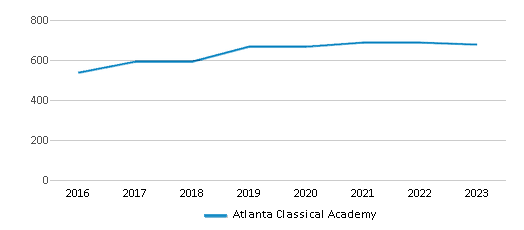
Gender %
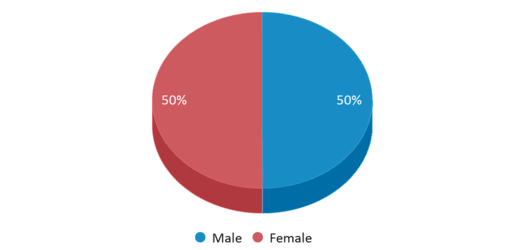
Total Classroom Teachers
59 teachers
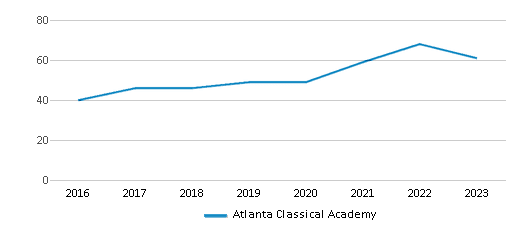
Students by Grade
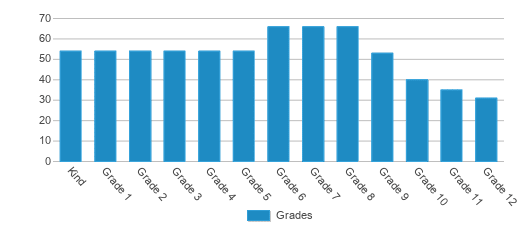
School Calendar
School Rankings
Atlanta Classical Academy ranks within the top 20% of all 2,204 schools in Georgia (based off of combined math and reading proficiency testing data).
The diversity score of Atlanta Classical Academy is 0.51, which is less than the diversity score at state average of 0.71. The school's diversity has stayed relatively flat over five school years.
Overall Testing Rank
#297 out of 2204 schools
(Top 20%)
(Top 20%)
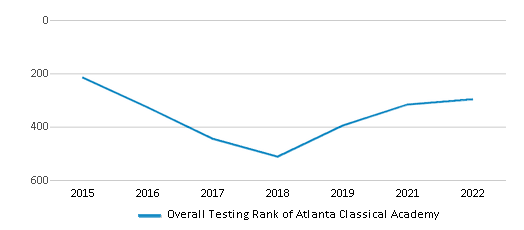
Math Test Scores (% Proficient)
54%
37%
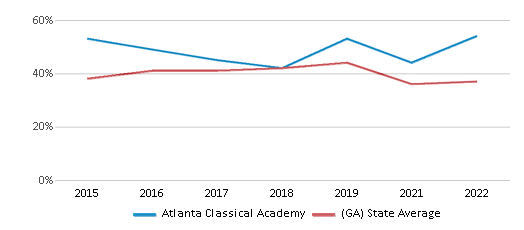
Reading/Language Arts Test Scores (% Proficient)
62%
40%
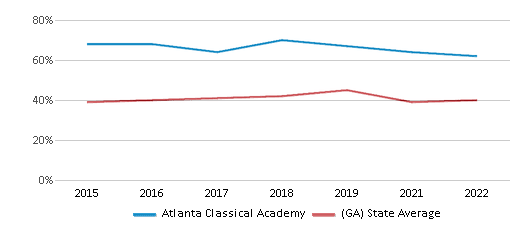
Science Test Scores (% Proficient)
55-59%
40%
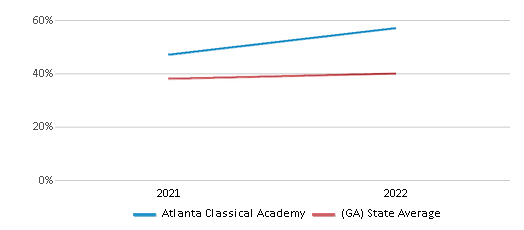
Student : Teacher Ratio
12:1
14:1
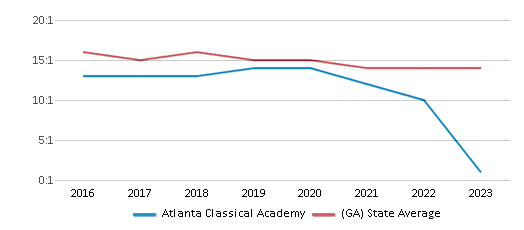
American Indian
n/a
n/a
Asian
1%
5%
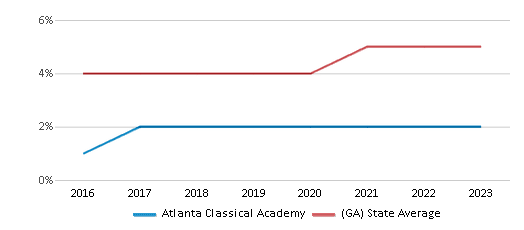
Hispanic
8%
19%
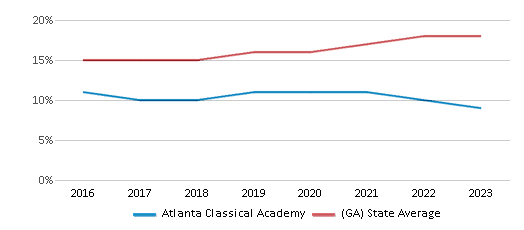
Black
16%
36%
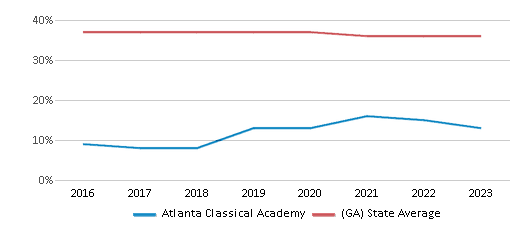
White
68%
35%
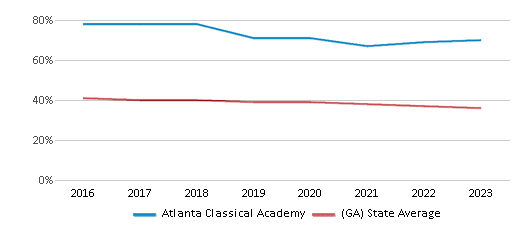
Hawaiian
n/a
n/a
Two or more races
7%
5%
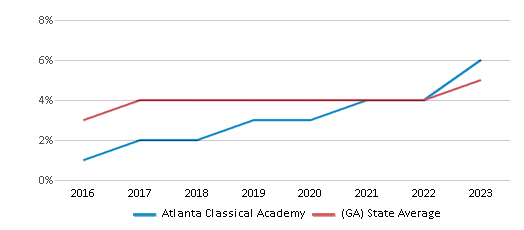
All Ethnic Groups
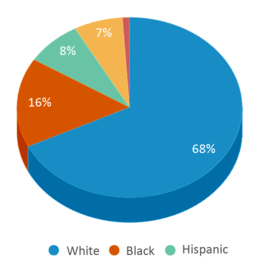
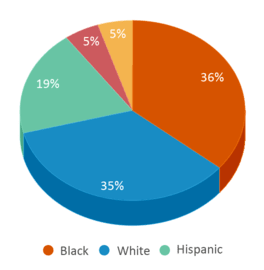
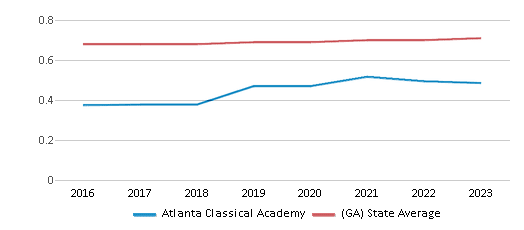
Graduation Rate
≥90%
84%
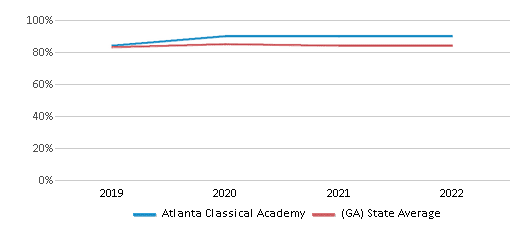
Participates in the National School Lunch Program (NSLP)
Yes
Eligible for Free Lunch
14%
59%
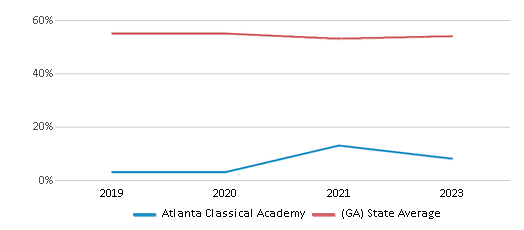
Eligible for Reduced Lunch
3%
5%
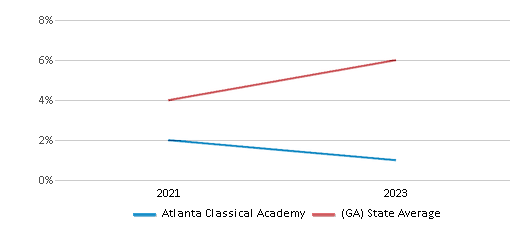
School Statewide Testing
School District Name
Sports
Total Sports Offered
9 sports
Sports
Baseball, Basketball, Cheering, Cross Country, Cross Country Running, Soccer, Track, Track and Field, Volley Ball
Extracurriculars
Total ExtracurricularsTotal Extra-curric.
21 extracurriculars
ExtracurricularsExtra-curric.
Club or Organization:
Airplane & Rocketry, Audio/Visual & Tech, Girl Club, HOSA Future Health Professionals, International Club, Junior Classical League, Key Club, Math Olympiad, Quiz Bowl, Sewing
Arts and Music Programs:
Choir, Dance Company, Digital Photography, Guitar, Keyboarding, Production and Design, String Ensemble
Recreational Athletic Programs:
Golf, Hiking, Sailing, Swimming
Airplane & Rocketry, Audio/Visual & Tech, Girl Club, HOSA Future Health Professionals, International Club, Junior Classical League, Key Club, Math Olympiad, Quiz Bowl, Sewing
Arts and Music Programs:
Choir, Dance Company, Digital Photography, Guitar, Keyboarding, Production and Design, String Ensemble
Recreational Athletic Programs:
Golf, Hiking, Sailing, Swimming
Source: National Center for Education Statistics (NCES), GA Dept. of Education
School Notes
- Atlanta Classical Academy is an open-enrollment, public charter school open to students who reside within the Atlanta Public Schools district. The school opened in 2014 with grades K 8, and has added a grade each year as students have advanced. It is now a K 12 academy.The mission of Atlanta Classical Academy is to develop studentsin mind and character through a classical, content-rich curriculum that emphasizes the principles of virtuous living, traditional learning, and civic responsibility.
Profile last updated: 02/09/2025
Frequently Asked Questions
What is Atlanta Classical Academy's ranking?
Atlanta Classical Academy is ranked #297 out of 2,204 schools, which ranks it among the top 20% of public schools in Georgia.
What percent of students have achieved state testing proficiency in math and reading?
54% of students have achieved math proficiency (compared to the 37% GA state average), while 62% of students have achieved reading proficiency (compared to the 40% GA state average).
What is the graduation rate of Atlanta Classical Academy?
The graduation rate of Atlanta Classical Academy is 90%, which is higher than the Georgia state average of 84%.
How many students attend Atlanta Classical Academy?
681 students attend Atlanta Classical Academy.
What is the racial composition of the student body?
68% of Atlanta Classical Academy students are White, 16% of students are Black, 8% of students are Hispanic, 7% of students are Two or more races, and 1% of students are Asian.
What is the student:teacher ratio of Atlanta Classical Academy?
Atlanta Classical Academy has a student ration of 12:1, which is lower than the Georgia state average of 14:1.
What grades does Atlanta Classical Academy offer ?
Atlanta Classical Academy offers enrollment in grades Kindergarten-12
What school district is Atlanta Classical Academy part of?
Atlanta Classical Academy is part of Atlanta School District.
In what neighborhood is Atlanta Classical Academy located?
Atlanta Classical Academy is located in the Buckhead neighborhood of Atlanta, GA. There are 5 other public schools located in Buckhead.
School Reviews
Review Atlanta Classical Academy. Reviews should be a few sentences in length. Please include any comments on:
- Quality of academic programs, teachers, and facilities
- Availability of music, art, sports and other extracurricular activities
Recent Articles

What Is A Charter School?
Explore the world of charter schools in this comprehensive guide. Learn about their history, how they operate, and the pros and cons of this educational innovation. Discover key facts about charter schools, including admission policies, demographics, and funding, as well as what to look for when considering a charter school for your child.

10 Reasons Why High School Sports Benefit Students
Discover the 10 compelling reasons why high school sports are beneficial for students. This comprehensive article explores how athletics enhance academic performance, foster personal growth, and develop crucial life skills. From improved fitness and time management to leadership development and community representation, learn why participating in high school sports can be a game-changer for students' overall success and well-being.

February 05, 2025
Understanding the U.S. Department of Education: Structure, Impact, and EvolutionWe explore how the Department of Education shapes American education, from its cabinet-level leadership to its impact on millions of students, written for general audiences seeking clarity on this vital institution.












